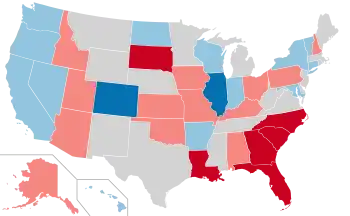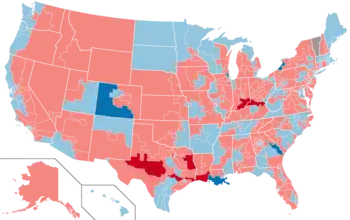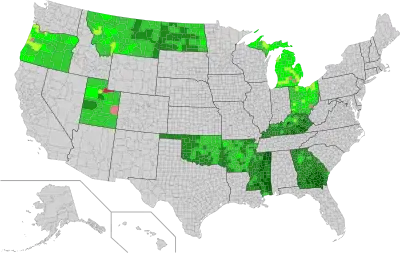2004 United States elections
The 2004 United States elections were held on November 2. Republican President George W. Bush won re-election and Republicans retained control of Congress.
| ← 2003 2004 2005 → Presidential election year | |
| Election day | November 2 |
|---|---|
| Incumbent president | George W. Bush (Republican) |
| Next Congress | 109th |
| Presidential election | |
| Partisan control | Republican hold |
| Popular vote margin | Republican +2.4% |
| Electoral vote | |
| George W. Bush (R) | 286 |
| John Kerry (D) | 251 |
 | |
| 2004 Presidential election results map. Red denotes states/districts won by Republican George W. Bush, and Blue denotes those won by Democrat John Kerry. Numbers indicate electoral votes allotted to the winner of each state. | |
| Senate elections | |
| Overall control | Republican hold |
| Seats contested | 34 of 100 seats |
| Net seat change | Republican +4 |
 | |
| 2004 Senate election results map | |
| House elections | |
| Overall control | Republican hold |
| Popular vote margin | Republican +2.6% |
| Net seat change | Republican +3 |
 | |
| 2004 House election results map | |
| Gubernatorial elections | |
| Seats contested | 13 (11 states, 2 territories) |
| Net seat change | None |
 | |
| 2004 Gubernatorial election results map | |
| Legend | |
| Democratic gain Republican gain Democratic hold Republican hold Popular Democratic hold Nonpartisan | |
Democratic Senator John Kerry of Massachusetts won his party's nomination after defeating Senator John Edwards and several other candidates in the 2004 Democratic presidential primaries. In the general election, Bush won 286 of the 538 electoral votes and 50.7 percent of the popular vote. Foreign policy was the dominant theme throughout the election campaign, particularly Bush's conduct of the War on Terrorism and the 2003 invasion of Iraq.
Riding Bush's coattails, the Republicans picked up net gains of four Senate seats and three House seats. In the gubernatorial elections, neither party won a net gain of seats.
As of 2020, this is the last time the incumbent party retained control over the presidency and Congress after a single term.
Federal elections
President
Republican incumbent President George W. Bush was re-elected, defeating Democratic Senator John Kerry from Massachusetts.
| Candidate | Votes | % | States led | National ECV |
|---|---|---|---|---|
| Republican George W. Bush | 62,040,610 | 50.73 | 31 | 286 |
| Democrat John Kerry | 59,028,444 | 48.27 | 19+DC | 251 |
| Independent Ralph Nader | 465,650 | 0.38 | - | - |
| Libertarian Michael Badnarik | 397,265 | 0.32 | - | - |
| Constitution Michael Peroutka | 143,630 | 0.12 | - | - |
| Green David Cobb | 119,859 | 0.096 | - | - |
| Peace and Freedom Leonard Peltier | 27,607 | 0.023 | - | - |
| Socialist Walt Brown | 10,837 | 0.009 | - | - |
| Socialist Workers Roger Calero, James Harris | 10,800 | 0.009 | - | - |
| None of these candidates (Nevada) | 3,688 | 0.003 | - | - |
| Thomas Harens | 2,387 | 0.002 | - | - |
| Prohibition Gene Amondson | 1,944 | 0.002 | - | - |
| Bill Van Auken | 1,857 | 0.002 | - | - |
| Workers World John Parker | 1,646 | 0.001 | - | - |
| Charles Jay | 946 | 0.001 | - | - |
| Stanford Andress | 804 | 0.001 | - | - |
| Prohibition Earl Dodge | 140 | 0.000 | - | - |
| Democrat John Edwards | - | - | - | 1 |
| Total | 122,267,553 | 100.000 | 50 + DC | 538 |
United States Senate
The 34 seats in the United States Senate Class 3 were up for election. Republicans had a net gain of 4 seats. Summary of the United States Senate elections, 2004 results []
| Parties | Total | |||||||||||||||||||||||||||||||||||||||||||||||||||||||||||||||||||||||||||||||||||||||||||||||||
|---|---|---|---|---|---|---|---|---|---|---|---|---|---|---|---|---|---|---|---|---|---|---|---|---|---|---|---|---|---|---|---|---|---|---|---|---|---|---|---|---|---|---|---|---|---|---|---|---|---|---|---|---|---|---|---|---|---|---|---|---|---|---|---|---|---|---|---|---|---|---|---|---|---|---|---|---|---|---|---|---|---|---|---|---|---|---|---|---|---|---|---|---|---|---|---|---|---|---|
| Democratic | Republican | Independent | Libertarian | Others | ||||||||||||||||||||||||||||||||||||||||||||||||||||||||||||||||||||||||||||||||||||||||||||||
| Before these elections | 48 | 51 | 1 | — | — | 100 | ||||||||||||||||||||||||||||||||||||||||||||||||||||||||||||||||||||||||||||||||||||||||||||
| End of this Congress (two months later) | 48 | 51 | 1 | — | — | 100 | ||||||||||||||||||||||||||||||||||||||||||||||||||||||||||||||||||||||||||||||||||||||||||||
| Not Up | 29 | 36 | 1 | — | — | 66 | ||||||||||||||||||||||||||||||||||||||||||||||||||||||||||||||||||||||||||||||||||||||||||||
| Up | 19 | 15 | — | — | — | 34 | ||||||||||||||||||||||||||||||||||||||||||||||||||||||||||||||||||||||||||||||||||||||||||||
| Incumbent retired |
Total before | 5 | 3 | — | — | — | 8 | |||||||||||||||||||||||||||||||||||||||||||||||||||||||||||||||||||||||||||||||||||||||||||
| Held by same party | — | 1 | — | — | — | 1 | ||||||||||||||||||||||||||||||||||||||||||||||||||||||||||||||||||||||||||||||||||||||||||||
| Replaced by other party | replaced by |
replaced by |
— | — | — | 7 | ||||||||||||||||||||||||||||||||||||||||||||||||||||||||||||||||||||||||||||||||||||||||||||
| Result after | 2 | 6 | — | — | — | 8 | ||||||||||||||||||||||||||||||||||||||||||||||||||||||||||||||||||||||||||||||||||||||||||||
| Incumbent ran |
Total before | 14 | 12 | — | — | — | 26 | |||||||||||||||||||||||||||||||||||||||||||||||||||||||||||||||||||||||||||||||||||||||||||
| Won re-election | 13 | 12 | — | — | — | 25 | ||||||||||||||||||||||||||||||||||||||||||||||||||||||||||||||||||||||||||||||||||||||||||||
| Lost re-election | replaced by |
— | — | — | 1 | |||||||||||||||||||||||||||||||||||||||||||||||||||||||||||||||||||||||||||||||||||||||||||||
| Lost renomination, held by same party | — | — | — | — | — | 0 | ||||||||||||||||||||||||||||||||||||||||||||||||||||||||||||||||||||||||||||||||||||||||||||
| Lost renomination, and party lost | — | — | — | — | — | 0 | ||||||||||||||||||||||||||||||||||||||||||||||||||||||||||||||||||||||||||||||||||||||||||||
| Result after | 13 | 13 | — | — | — | 26 | ||||||||||||||||||||||||||||||||||||||||||||||||||||||||||||||||||||||||||||||||||||||||||||
| Net gain/loss | — | — | — | 4 | ||||||||||||||||||||||||||||||||||||||||||||||||||||||||||||||||||||||||||||||||||||||||||||||
| Total elected | 15 | 19 | — | — | — | 34 | ||||||||||||||||||||||||||||||||||||||||||||||||||||||||||||||||||||||||||||||||||||||||||||
| Result | 44 | 55 | 1 | — | — | 100 | ||||||||||||||||||||||||||||||||||||||||||||||||||||||||||||||||||||||||||||||||||||||||||||
| Popular vote |
Votes | 44,754,618 | 39,920,562 | 186,231 | 754,861 | 2,481,075 | 88,097,347 | |||||||||||||||||||||||||||||||||||||||||||||||||||||||||||||||||||||||||||||||||||||||||||
| Share | 50.80% | 45.31% | 0.21% | 0.86% | 2.82% | 100% | ||||||||||||||||||||||||||||||||||||||||||||||||||||||||||||||||||||||||||||||||||||||||||||
Sources:
United States House of Representatives
Republicans gained a couple of seats in the House, mainly due to the 2003 Texas redistricting. Republicans won the national popular vote for the House of Representatives by a margin of 2.6 percentage points.[1]
| Parties | Seats | Popular vote | ||||||
|---|---|---|---|---|---|---|---|---|
| 2002 | 2004 | Net change |
Strength | Vote | % | Change | ||
| Republican Party | 229 | 232 | 53.3% | 55,958,144 | 49.4% | -0.6% | ||
| Democratic Party | 205 | 202 | 46.4% | 52,969,786 | 46.8% | +1.6% | ||
| Libertarian Party | — | — | — | — | 1,056,844 | 0.9% | -0.5% | |
| Independent | 1 | 1 | 0 | 0.2% | 674,202 | 0.6% | +0.1% | |
| Green Party | — | — | — | — | 344,549 | 0.3% | -0.1% | |
| Constitution Party | — | — | — | — | 187,006 | 0.2% | - | |
| Others | — | — | — | — | 2,001,755 | 1.8% | -0.5% | |
| Total | 434 | 435 | 0 | 100.0% | 113,192,286 | 100.0% | – | |
| Source: Election Statistics - Office of the Clerk | ||||||||
State elections
Governors
Eleven of the fifty United States governors were up for re-election, as were the governorships of two U.S. territories. The final results were a net change of zero between the political parties. The Democrats picked up the governorships in Montana and New Hampshire, but the Republicans picked up the ones in Indiana and Missouri.
Other statewide elections
In many states where if the following positions were elective offices, voters cast votes for candidates for state executive branch offices of Lieutenant Governor (though some were voted for on the same ticket as the gubernatorial nominee), Secretary of state, state Treasurer, state Auditor, state Attorney General, state Superintendent of Education, Commissioners of Insurance, Agriculture or, Labor, etc.) and state judicial branch offices (seats on state Supreme Courts and, in some states, state appellate courts).
State legislative elections
Many states across the nation held elections for their state legislatures.[2]
Initiatives and referenda

- State constitutional amendments prohibiting same-sex marriage are passed in eleven states: Arkansas, Georgia, Kentucky, Michigan, Mississippi, Montana, North Dakota, Ohio, Oklahoma, Oregon, and Utah. The measures in Oregon, Mississippi, and Montana bans same-sex marriage only, while Arkansas, Georgia, Kentucky, North Dakota, Oklahoma, Ohio, and Utah bans both same-sex marriage and civil unions and Michigan bans granting any benefits whatsoever to same-sex couples.[3]
Local elections
Mayoral elections
Some of the major American cities that held their mayoral elections in 2004 included:
- Chesapeake – Dalton S. Edge won an open seat race to succeed outgoing Mayor William E. Ward.[4]
- Jersey City- In a special election triggered due to the passing of Glenn Cunningham (D), attorney Jerramiah Healy (D) defeated General Assemblyman Louis Manzo (D) and Acting Mayor L. Harvey Smith (D) to serve the rest of the unexpired term.
- San Diego – Incumbent Mayor Dick Murphy (R) was re-elected, but resigned five months later.[5]
References
- "Statistics of the Presidential and Congressional Election of November 2, 2004" (PDF). U.S. House of Reps, Office of the Clerk. Retrieved 10 April 2017.
- "2004 Presidential Election". The American Presidency Project. Retrieved 10 April 2017.
- "(365Gay)". Archived from the original on 2008-06-17. Retrieved 2013-06-07.
- >Armstrong, Kevin (2008-01-10). "Chesapeake mayor Dalton Edge won't run for second term". The Virginian-Pilot.
- Dillon, Jeff (2005-04-25). "San Diego mayor announces departure less than 5 months into second term". San Diego Union-Tribune.
Further reading
- Ceaser, James W. and Andrew E. Busch. Red Over Blue: The 2004 Elections and American Politics (2005), narrative history.
- Greene, John C. and Mark J. Rozell, eds. The Values Campaign?: The Christian Right and the 2004 Elections (2006).
- Sabato, Larry J. Divided States of America: The Slash And Burn Politics of the 2004 Presidential Election (2005).
- Stempel III, Guido H. and Thomas K. Hargrove, eds. The 21st-Century Voter: Who Votes, How They Vote, and Why They Vote (2 vol. 2015).
External links
- United States Election 2004 Web Archive from the U.S. Library of Congress